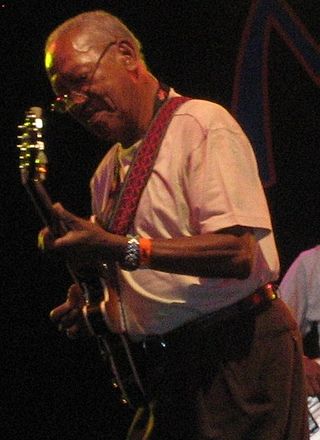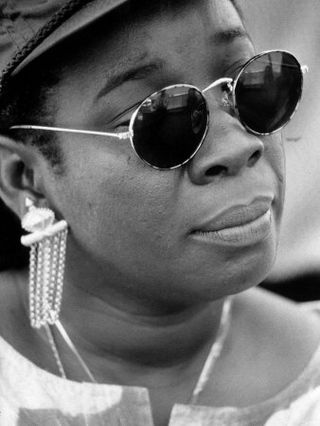
Reggae is a music genre that originated in Jamaica in the late 1960s. The term also denotes the modern popular music of Jamaica and its diaspora. A 1968 single by Toots and the Maytals, "Do the Reggay", was the first popular song to use the word reggae, effectively naming the genre and introducing it to a global audience. While sometimes used in a broad sense to refer to most types of popular Jamaican dance music, the term reggae more properly denotes a particular music style that was strongly influenced by traditional mento as well as American jazz and rhythm and blues, and evolved out of the earlier genres ska and rocksteady. Reggae usually relates news, social gossip, and political commentary. It is instantly recognizable from the counterpoint between the bass and drum downbeat and the offbeat rhythm section. The immediate origins of reggae were in ska and rocksteady; from the latter, reggae took over the use of the bass as a percussion instrument.
Roots reggae is a subgenre of reggae that deals with the everyday lives and aspirations of Africans and those in the African Diaspora, including the spiritual side of Rastafari, black liberation, revolution and the honoring of God, called Jah by Rastafarians. It is identified with the life of the ghetto sufferer, and the rural poor. Lyrical themes include spirituality and religion, struggles by artists, poverty, black pride, social issues, resistance to fascism, capitalism, corrupt government and racial oppression. A spiritual repatriation to Africa is a common theme in roots reggae.
The music of Jamaica includes Jamaican folk music and many popular genres, such as mento, ska, rocksteady, reggae, dub music, dancehall, reggae fusion and related styles.
Rocksteady is a music genre that originated in Jamaica around 1966. A successor of ska and a precursor to reggae, rocksteady was the dominant style of music in Jamaica for nearly two years, performed by many of the artists who helped establish reggae, including harmony groups such as the Techniques, the Paragons, the Heptones and the Gaylads; soulful singers such as Alton Ellis, Delroy Wilson, Bob Andy, Ken Boothe and Phyllis Dillon; musicians such as Jackie Mittoo, Lynn Taitt and Tommy McCook. The term rocksteady comes from a popular (slower) dance style mentioned in the Alton Ellis song "Rocksteady", that matched the new sound. Some rocksteady songs became hits outside Jamaica, as with ska, helping to secure the international base reggae music has today.

Ernest Ranglin is a Jamaican guitarist and composer who established his career while working as a session guitarist and music director for various Jamaican record labels including Studio One and Island Records. Ranglin played guitar on many early ska recordings and helped create the rhythmic guitar style that defined the form. Ranglin has worked with Theophilus Beckford, Jimmy Cliff, Monty Alexander, Prince Buster, the Skatalites, Bob Marley and the Eric Deans Orchestra. He is noted for a chordal and rhythmic approach that blends jazz, mento and reggae with percussive guitar solos incorporating rhythm 'n' blues and jazz inflections.

Bob Marley and the Wailers were a Jamaican ska, rocksteady and reggae band. The founding members, in 1963, were Bob Marley, Peter Tosh, and Bunny Wailer.
There are several subgenres of reggae music including various predecessors to the form.

Alfarita Constantia Marley is a Cuban-born Jamaican singer, songwriter and entrepreneur. She is the widow of reggae legend Bob Marley. Along with Marcia Griffiths and Judy Mowatt, she was a member of the reggae vocal group the I Threes, the backing vocalists for Bob Marley and the Wailers.
Delroy George Wilson CD was a Jamaican ska, rocksteady and reggae singer. Wilson is often regarded as Jamaica's first child star, having first found success as a teenager. His youngest son, Karl "Konan" Wilson, has found success as part of British duo Krept and Konan.
Leslie Kong was an influential Chinese-Jamaican reggae producer.
The Tartans, also known as Devon and the Tartans, were a rocksteady group who came together in 1967 in Kingston, Jamaica. The members were initially Prince Lincoln Thompson, Cedric Myton, Devon Russell and Lindberg Lewis. Myton and Russell had previously been in a group called the Bellstars. The Tartans formed as a result of the Bellstars break-up.

Judith Veronica Mowatt, is a Jamaican reggae artist. As well as being a solo artist, from 1974 she was also a member of the I Threes, the trio of backing vocalists for Bob Marley & The Wailers.

The Ethiopians were one of Jamaica's best-loved harmony groups during the late ska, rocksteady and early reggae periods. Responsible for a significant number of hits between the mid-1960s and early 1970s, the group was also one of the first Jamaican acts to perform widely in Britain.
Heartbeat Records is an independent record label based in Burlington, Massachusetts. The label specializes in Jamaican music.
Clive Hunt is a Jamaican reggae multi-instrumentist, arranger, composer and producer.

The Gladiators are a Jamaican roots reggae band, most popular during the 1970s. The core was Albert Griffiths, Clinton Fearon and Gallimore Sutherland. Their two most famous albums are Trenchtown Mix Up (1976) and Proverbial Reggae (1978) with songs such as "Hearsay", "Jah Works", "Dreadlocks the Time is Now". "Mix Up", "Music Makers from Jamaica", and "Soul Rebel" – a song written by The Wailers. Gladiators also cooperated with the toaster U-Roy.

Most of Bob Marley's early music was recorded with Peter Tosh and Bunny Wailer, who together with Marley were the most prominent members of the Wailers. In 1972, the Wailers had their first hit outside Jamaica when Johnny Nash covered their song "Stir It Up", which became a UK hit. The 1973 album Catch a Fire was released worldwide, and sold well. It was followed by Burnin', which included the song "I Shot the Sheriff". Eric Clapton's cover of the song became a hit in 1974.
Fitzroy Ernest Wilson was a Jamaican reggae singer who found fame as a member of the Clarendonians before working as a solo artist.
Front Line was a reggae subsidiary of Virgin Records established in 1978. Over forty albums were issued on the label before it folded in 1979.

Neville O'Riley Livingston, known professionally as Bunny Wailer, was a Jamaican singer-songwriter and percussionist. He was an original member of reggae group The Wailers along with Bob Marley and Peter Tosh. A three-time Grammy Award winner, he is considered one of the longtime standard-bearers of reggae music. He was also known as Jah B, Bunny O'Riley, and Bunny Livingston.









